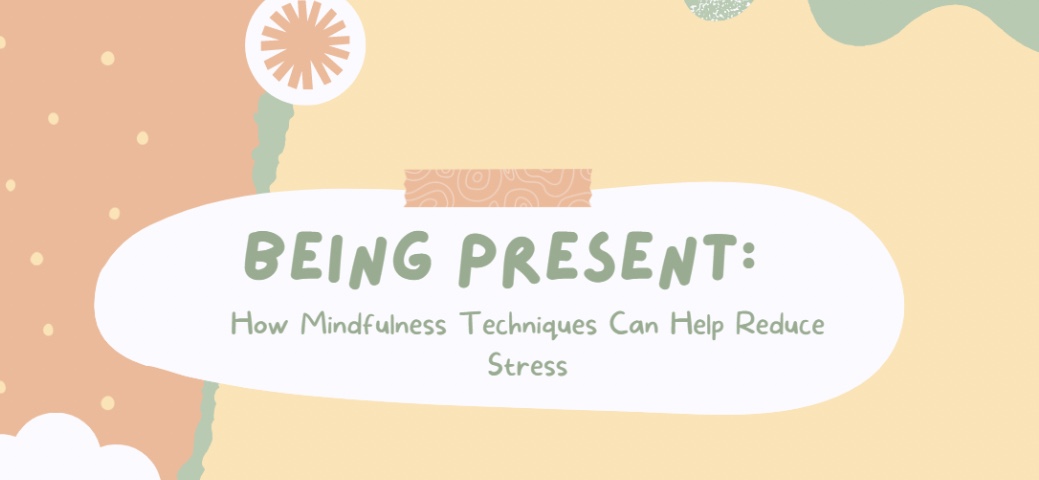Image Citation: (Continued Wellness, 2023) Alt Text: A pastel-colored graphic with the title “Being Present: How Mindfulness Techniques Can Help Reduce Stress” centered on a white oval. The background features soft peach and beige tones with abstract decorative elements
Learning Objectives:
By the end of the lesson, the Student will be able to:
- Explore two aspects of mindfulness (physical self-care and emotional self-care)
- Identify mindfulness techniques and their short and long-term benefits
- Practice mindfulness techniques and reflect on their effects on stress management
- Identify how mindfulness can be integrated into daily routines
- Create personalized mindfulness strategies that reflect their lifestyle and strengths
A brief mindfulness/meditation activity: https://www.youtube.com/watch?v=ABK0SYFxyEY
Self-care is an important aspect for many postsecondary students who face academic and social challenges. Learning how mindfulness supports self-care may reduce stress, improve focus, and enhance emotional regulation. This lesson will focus on two aspects of mindfulness: Physical and Emotional self-care.
Part 1: Physical self-care
Physical self-care refers to practices that prevent negative health outcomes and maintain or enhance physical health, overall wellbeing and quality of life. Incorporating mindfulness into physical self-care helps students recognize and address their physical needs.
Key components:
- Hydration: Our bodies use water to regulate our temperature, lubricate and cushion our joints, protect our spinal cord and other sensitive tissues, and help eliminate waste.
- Nutrition: A balanced diet should include different kinds of foods to ensure adequate intake.
- Sleep: Sleep is very important for health since it restores physical strength, rebuild the immune system, and promote the proper functioning of brain functions.
Key strategies:
- Mindful breathing
- Walking
- Stretching
- Enough sleep
Required Video/Readings:
https://www.mymentalhealth.guide/self-care/physical-self-care
https://ed.buffalo.edu/mindful-assessment/scale/domains/physical-care.html
Additional Video and Reading:
https://odphp.health.gov/sites/default/files/2019-09/Physical_Activity_Guidelines_2nd_edition.pdf
Part 2: Emotional self-care
Emotional self-care focuses on practices that improve mental and emotional well-being. Mindfulness supports emotional self-care by increasing awareness of feelings, helping students manage stress and navigate negative emotions.
Key component:
- Stress Management: Due to academic pressure and social demands, post secondary students often feel stressful and overwhelmed. Effective stress management can help understand why we feel stress, how it impacts our body, and how we can cope with it.
- Boundaries: It is important to say no when you are not able to handle more and start to feel overwhelmed. Boundaries can protect our energy and emotional health, making sure we have time for self-care.
- Support System: Building a supportive network is helpful for emotional resilience. Fostering connections with people who support you can provide you encouragement and reduce a sense of isolation, especially when you are undergoing difficulties.
Key strategies:
- Meditation
- Practicing Gratitude
- Counselling
- Journalling
Required Reading/Video:
https://www.nih.gov/health-information/emotional-wellness-toolkit
Conclusion
Self-care requires multiple methods; most importantly, people must understand themselves first. Everyone’s coping strategies may be different and it is best to find ways to relieve stress. Knowing limitations is also crucial because sometimes pushing yourself too much can be stressful. Taking care of one’s physical and emotional well-being is the key to success.
